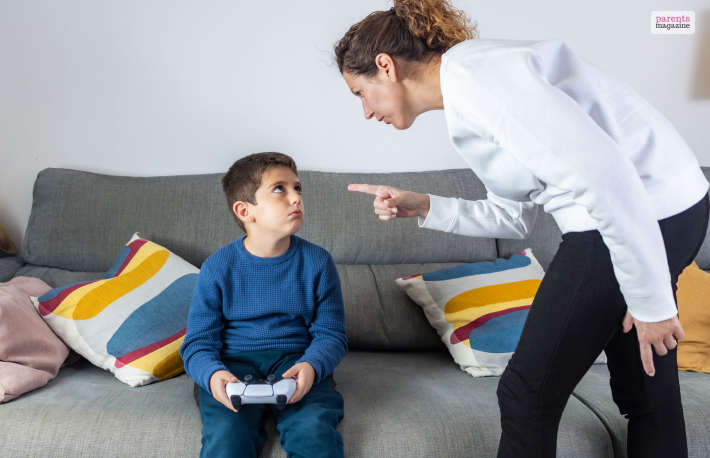
The Effects Of Controlling Parents On Child Development
The inevitable effects parenting has in a child’s life can lead to either extremely well outcomes or it can push them to the depths of darkness. The behaviors of a parent can shape the psyche of a child that often follows them to their adulthood like a shadow.
Controlling parents often leave the scar mark of their controlling behaviors upon their children, making them doubt their autonomy over their own health and well-being.
It has been found in several surveys that adult college students are shaky about such autonomy of their health and well-being. They often claim that someone from the outside controls their lives. When looked closely, the root of the problem was evident in parenting.
Different Types Of Controlling Parents

A controlling mother or a father often acts as the prevalent source of such helplessness among teenagers and young adults. Experts have categorized these controlling parents into two separate categories, as mentioned below –
Behavioral Control
Controlling parents often control the behaviors of their children. They are very strict about disciplining their children; they are constantly monitoring their children’s movements and whereabouts and intervening in their social life. The key purpose of behavioral control is to make the children conform to the family or the social norms.
Such control takes away the autonomy of the children and hinders the process of creating a separate identity not related to their parents. Having autonomy over one’s well-being prepares one for adulthood.
Indeed behavioral control over children is necessary ( to a certain extent.) it helps parents teach good behaviors and mannerisms. However, crossing the extent and controlling every minute behavior of the children has a negative effect.
Psychological Control
Psychological control is another way controlling parents use to manipulate and control their children. Such control interrupts the psychological and emotional development of the children.
Such parents are prone to invalidating, constraining, and being non-responsive to the emotional needs of the child. They also ignore or walk over the psychological needs of the children. These parents also constrain and manipulate the psychological experience of the children. Even the child’s independent emotional expression does not go unruffled.
These parents are manipulative about the thoughts, ideas, and emotions of the children. They use feelings of guilt, fear, love, and withdrawal as devices for manipulation. Children of such parents find their parents psychologically intrusive, directive, and possessive. Controlling through guilt is one of their specialties.
Sometimes such parenting reaches an extreme level turning the parents into abusive parents or toxic parents.
Effects Of Controlling Parents On Children’s Life

Difficulty Maintaining Relationships
Every child goes up to become an adult someday. When it comes to finding a partner and forming a relationship, most adults with a childhood with controlling parents suffer the most. They struggle a lot when it comes to assertiveness, independence, and providing their partner with emotional support. This is why forming and maintaining a relationship is difficult for them.
Educational Attainment
Children who are constantly under their parents’ control also don’t have the liberty to choose their preferences or take their careers in the direction they want. Most of them end up having lower academic success and satisfaction. When it comes to careers, they also can’t settle for higher dreams.
Being Indecisive
As someone who grew up with controlling parents, adults have a hard time deciding something for themselves. It includes their career, the passion they want to pursue, and other aspirations in life. They can be stuck at the same job even if they have the potential for more. Such adults are also indecisive when it comes to their relationships with their friends, partners, and parents as well.
They are afraid to take risks, whether it’s about letting go of a toxic person or a job. Their indecisiveness becomes the end of who they are and their best selves.
Low Self-esteem
Imagine you grew up with people who constantly gave you negative feedback. You spent your entire life internalizing that feedback and building your perception around it. Yes, controlling parents are best at handling children with low self-esteem. Their lifelong struggle with themselves makes them suffer for years throughout their life.
Clingy & Needing Guidance
It’s common for such people to become clingy. They live their entire life with little appreciation and recognition. So, when they start to get validation and recognition from others around them, they cling to them. Their own perception of being undeserving of love or adulation makes them quite clingy to people who show little love.
Becoming a People Pleasure
The next stage of being clingy is becoming a people pleasure. Such people end up trying to please everyone around them.
Lacking Responsibilities
People with such personalities often struggle to maintain any responsibility in life. When they are adults and have responsibilities in life, they fail to carry out some of them. In addition, they have a high chance of letting down people who count on them.
Controlling Parents Following Into Adulthood
The monsters of childhood still chase some people during their adulthood. It is hard to have over-controlling parents in adulthood. It gets harder compared to childhood. They often interfere in their children’s lives, even during adulthood.
Simply put, controlling parents take away the ability of their children to be autonomous human beings. These children don’t have the right to make mistakes of their own, let alone correct them. Children need to have a sense of autonomy and independence to step into their adulthood.
Some controlling parents offer love on condition, resultantly taking away the scope for the child’s emotional development. Such influence takes away the child’s ability to think of a stable and healthy romantic relationship. The effect also follows them to their workplace relationships and their friendships.
However, it can also have the opposite effect on children and make them develop a sternly independent nature as a defense mechanism. So, when they are adults, they lose the nature to conform to others.
Signs That You Have A Controlling Parent

Here are some signs that suggest you have a controlling parent.
1. Interfering In Everything
It is not healthy for parents to force children to be part of their every decision. One of the most conspicuous signs of controlling parents is their interference in every little thing their child takes a part in. It can be their group activities, sports, and school projects.
2. Criticizing The Choice Made By Their Children
Controlling parents have a knack for criticizing every choice children make. They are prone to having problems with the choice of dress or hairstyle. You can also face criticism for choosing something over your choice.
3. Unattainable Standards
Children have a hard time growing up under the pressure of controlling parents and their paramount expectations. They set such a high standard for a good personality, behavior, and career that it is impossible to attain.
4. Withholding Love
Controlling parents offer love to their children on the condition that their standards being upheld. They withhold their love, approval, acknowledgment, and affection and provide them with conditions. Do you need examples? They only say good things about you when you have good grades.
5. Rigidity
Controlling parents create a rigid atmosphere around them with no room for flexibility and explanation. Children, even when they are grown-ups, fail to break out from this rigidity. According to some experts, parents take such actions to project their anxieties upon their children.
6. Lack Of Respect And Empathy
Controlling parents are often disrespectful about the autonomy of their children. They are also ignorant of the personal space their child needs or the boundaries they need to maintain. It is also difficult to show empathy to their child when needed.
7. Harsh Punishment For Failure
If, under any circumstance, the child fails to complete a given task or to meet their standards, the controlling parents have harsh punishment for them in return.
8. Lack Of Appreciation For Individuality
Controlling parents don’t show any empathy for their children. They hardly understand the autonomy of their children and lack empathy towards them. Such parents have a lack of understanding of the increasing need for their children’s autonomy and privacy. Instead of accepting their child’s autonomy, they try controlling and directing every choice of their children to make their visions about the children come true.
9. Imposing Adult Responsibilities Upon Children
Such parents assign their children the responsibilities of an adult and expect them to act like an adult. Many expert therapists often say that parents do such activities to ensure the internal helplessness of their own.
10. Giving You Gifts To Manipulate You
Children with controlling parents sometimes manipulate their children with gifts. For example, you may receive a gift if you listen to what they have planned.
11. Using Guilt Or Shame To Manipulate Children
It is common to use guilt or shame as a manipulation device for the controlling parents. They usually manipulate you by saying things like, “what you did was shameful to our family,” or “ you will regret it when I am not around.”
How To Deal With Controlling Parents?

Having controlling parents is difficult. As a child, it is difficult to deal with their different expectations, behaviors, and manipulations. But here are different ways to help you deal with such parents –
1. Distinguish The Problems
Your parents raised you, and it is difficult to go against your parents even when they are taking inappropriate actions. When these controlling behaviors become conspicuous, it is difficult to control your anger; for some children, it is also difficult to resist the feeling of denial about their controlling behavior.
So, what a child can do is to be able to distinguish between healthy and unhealthy expectations from their parents. If any behavior of the parents is hindering the child’s self-development, and reducing their self-esteem, then it is possible that the parents have a very controlling nature.
2. Create Boundaries
As the level of controlling nature becomes stronger, the children fall prey to the dysfunctional pattern of their parent’s behaviors. However, a child needs to create strong and clear boundaries to break out from such conditions.
Yes, it will feel uncomfortable at first, and children might also feel scared, but it is necessary to set a boundary to stop such controlling activities. It is a child’s right to make different choices but with due respect. It is the most acceptable way for a child to develop autonomy in their lives.
3. Get Support From Others
Children with a controlling parent need to get support, validation, and comfort from someone from the outside. They need someone on their side to also advocate on their behalf sometimes. It would be good to take help from other family members or friends of the child’s parents.
4. Create Necessary Space
If creating a personal boundary in a loving and respectful manner does not work, children may create emotional space and distance themselves from their parents in other ways.
However, as an adult, children of such parents can try to help their parents improve their controlling behaviors, reconcile with them or continue to tolerate them. But, if none of this works, creating more space between them would be necessary.
Key Takeaways
Before we conclude, let us quickly go through the tell-tale signs of controlling parents:
- They believe they are always correct
- Set rigid rules
- Lack of empathy for the child
- No respect for privacy
- Highly critical of their children
- Children can be looked into, not heard
- Arbitrary family rules to exert stronger dominion
- Refuse to share the child’s perspective
- Punishing, unforgiving and coercive nature
- Using negative criticism, such as disappointment and shame, to manipulate
- Reasons with “because I said so” for their acts
- Always trying to “help” without being asked
- Dictative of every aspect of the child’s life
- Non-permissive of the child’s participation in matters that involve them
- Commands blind conformity and obedience
- Always ordering the child about what they should do
- Emotionally immature to understand terms like freedom and growth
- Withdraw love and induct guilt to make children do what they desire
Final Thoughts
It is important for children to understand the adverse effects of controlling parents. Once they understand the negativity of such parenting that affects their self-esteem and confidence, they can work to reduce the effects.
But working to improve such relationships is easier said than done. Children feel awfully guilty about being angry with their parents since they raised them. However, one should not throw away the autonomy of their life either because of such emotions. The tips provided in this article should be able to help you. You can also see a therapist or talk to experts who can help you solve such issues.
Read Also:
Already have an account?
Sign In
Create your account
User added successfully. Log in









